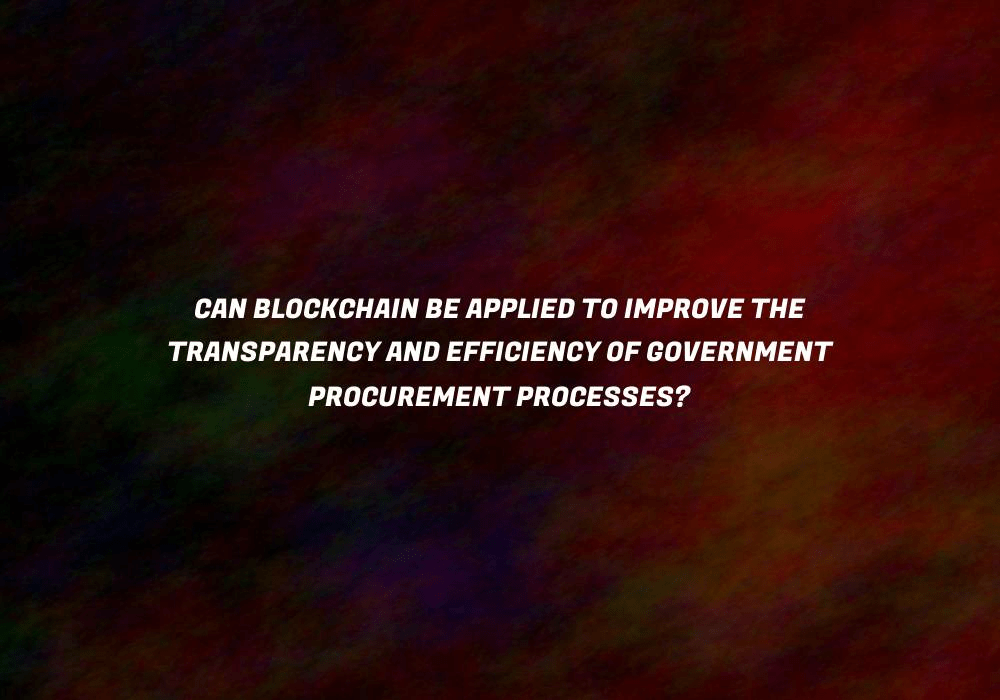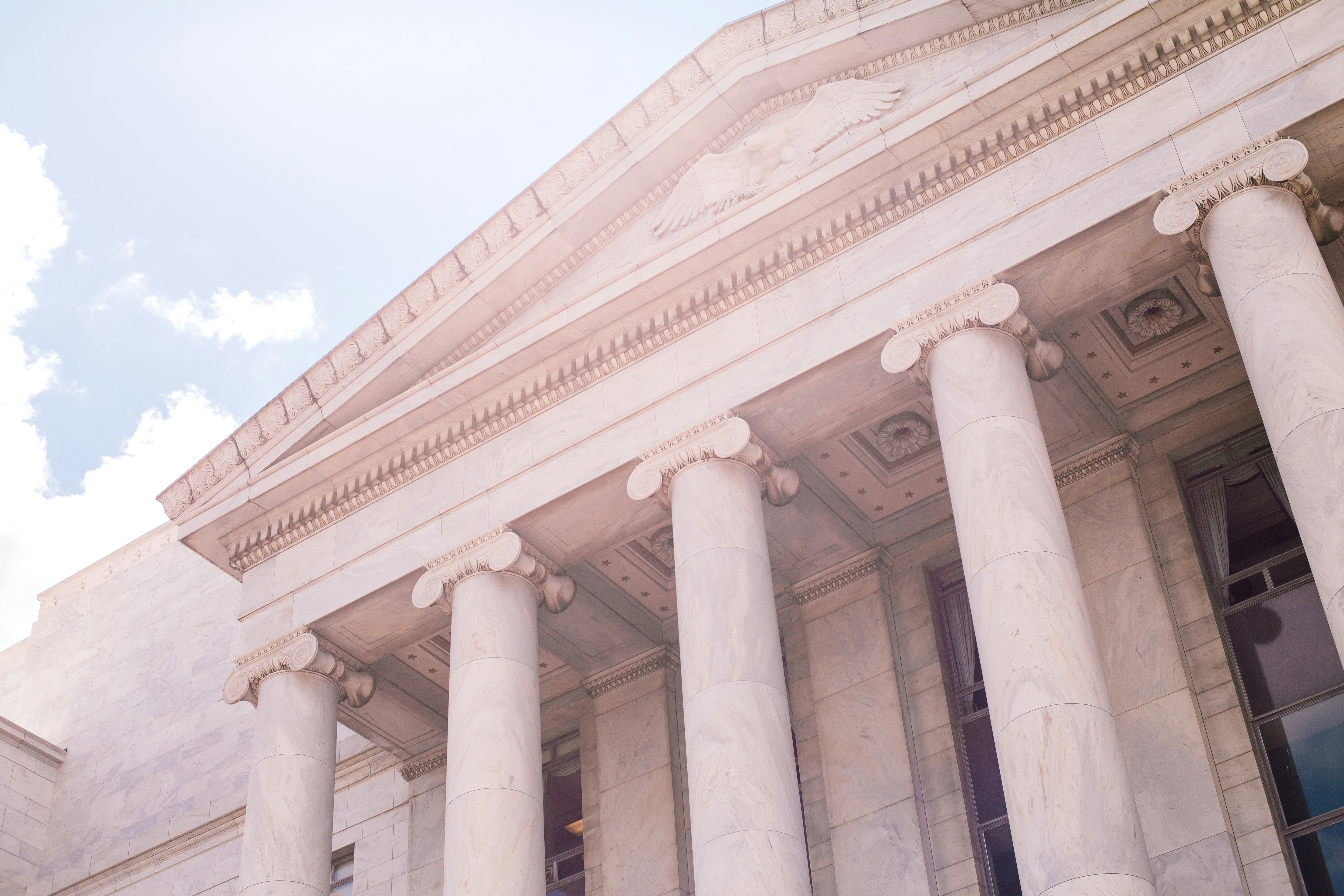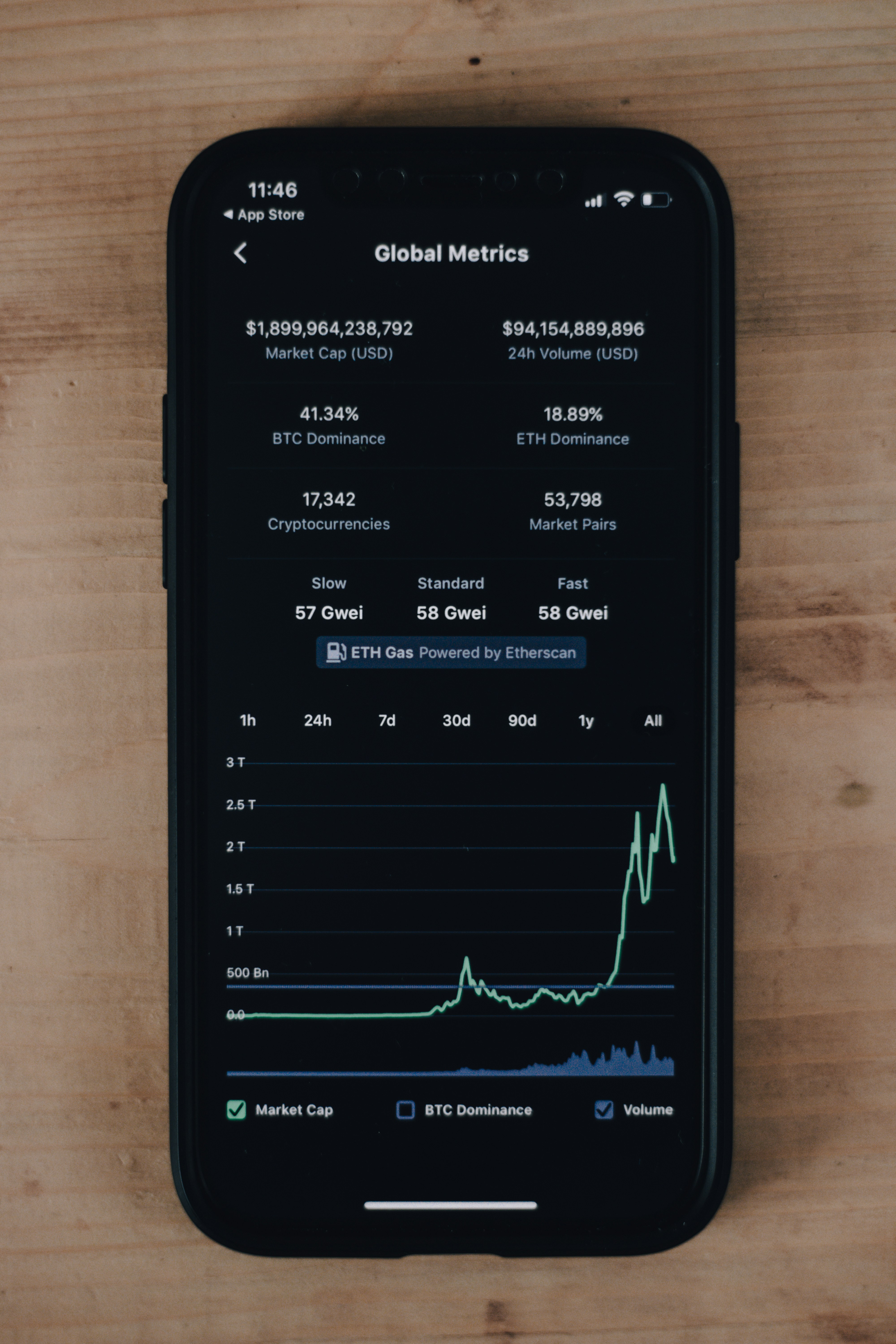Imagine a world where government procurement processes are transparent, efficient, and free from any sort of corruption. This may seem like a utopian dream, but with the rise of blockchain technology, it could soon become a reality. Blockchain has the potential to revolutionize the way governments handle procurement by providing a distributed ledger system that ensures transparency, immutability, and accountability. By harnessing the power of blockchain, governments can ensure fair and secure procurement processes that benefit both the public and private sectors. In this article, we will explore the potential applications of blockchain in government procurement and the benefits it can bring to both the process and the people involved.
The Importance of Transparency and Efficiency in Government Procurement Processes
In the realm of government procurement, transparency and efficiency are crucial factors that can greatly impact the overall success of the processes. Transparency ensures that the procurement procedures are open, accountable, and fair, while efficiency ensures that the processes are streamlined and cost-effective. When these two elements are effectively implemented, it can lead to significant benefits such as increased trust in the government, reduced corruption and fraud, enhanced accountability, and improved overall efficiency.
Transparency in Government Procurement
Transparency in government procurement refers to the clear and open communication of information regarding procurement processes, decisions, and outcomes. It is essential for ensuring that all stakeholders, including the public, can understand and evaluate the fairness and integrity of government procurement practices. By providing access to information, governments can strengthen trust and confidence in their procurement processes, thereby promoting accountability and reducing the likelihood of corruption or favoritism.
To achieve transparency, governments can adopt various measures such as publishing procurement plans, announcing contract award decisions, and making procurement documents easily accessible to the public. These actions can help create a level playing field for all participants, allowing them to have equal opportunities in bidding for government contracts. Additionally, transparency enables businesses and suppliers to understand the requirements and criteria set by the government, leading to fair competition and better quality of goods and services procured.
Efficiency in Government Procurement
Efficiency in government procurement is centered around ensuring that procurement processes are carried out quickly, effectively, and cost-efficiently. By improving the efficiency of procurement, governments can maximize the value of public spending, allocate resources effectively, and promote economic growth. Efficient procurement processes also save time for both government entities and bidders, making it more attractive for businesses to participate in government contracts.
Efficiency can be achieved through various methods, including the automation of procurement processes, the use of standardized procedures, and the adoption of modern technologies. One such technology that holds great promise in revolutionizing government procurement is blockchain.
Understanding Blockchain Technology
Before delving into the benefits and challenges of applying blockchain in government procurement, it is crucial to have a clear understanding of what blockchain technology entails.
Definition of Blockchain
Blockchain is a decentralized, distributed ledger technology that enables the secure and transparent recording of digital transactions across multiple computers or nodes. Each transaction, or block, is linked to the previous one, forming a chain of blocks, hence the name “blockchain.” This technology relies on cryptography to ensure the integrity and security of the recorded data, making it tamper-resistant and highly reliable.
How Blockchain Works
Blockchain technology works through a consensus mechanism, where all participants in the network agree on the validity of transactions. Once a transaction is validated, it is added to a block, which is then added chronologically to the existing chain. The decentralized nature of blockchain ensures that no single entity has control over the entire network, making it difficult for malicious actors to manipulate or alter the recorded data.
Key Features of Blockchain
There are several key features that make blockchain technology highly suitable for government procurement processes:
-
Decentralization: Blockchain operates on a peer-to-peer network without the need for a central authority, allowing for greater transparency and eliminating the risk of a single point of failure.
-
Immutability: Once a transaction is recorded on the blockchain, it cannot be altered or deleted, providing a high level of integrity and preventing fraud or manipulation.
-
Transparency: All participants in the blockchain network can access and verify the transactions, promoting trust and accountability.
-
Security: Blockchain relies on advanced cryptographic techniques to ensure the privacy and security of the recorded data.
-
Smart Contracts: Blockchain can facilitate the implementation of self-executing smart contracts, which automate the enforcement of terms and conditions in procurement contracts, reducing the need for intermediaries and improving process efficiency.
Benefits of Applying Blockchain in Government Procurement Processes
The application of blockchain technology in government procurement processes offers numerous benefits, ranging from increased transparency and reduced corruption to enhanced accountability and streamlined workflow.
Increased Transparency
By leveraging blockchain technology, governments can significantly enhance the transparency of their procurement processes. All transactions recorded on the blockchain are transparent and accessible to all network participants. This enables suppliers, government officials, and the public to have a clear view of the procurement activities, ensuring the fairness and integrity of the processes. Improved transparency also reduces the risk of bribery, favoritism, or other corrupt practices, as any attempt to manipulate the data would be immediately visible in the blockchain.
Reduced Corruption and Fraud
One of the major challenges in government procurement is corruption and fraud. Traditional procurement processes often lack transparency, making it easier for corrupt individuals to exploit the system for personal gain. With blockchain, every step of the procurement process can be recorded and verified, leaving an immutable trail of transactions. This makes it significantly more difficult for individuals to engage in fraudulent activities, as any attempts to manipulate the data would be immediately detected and exposed. By reducing corruption and fraud, blockchain can help governments save billions of dollars and ensure the efficient allocation of public resources.
Enhanced Accountability
Blockchain technology also promotes enhanced accountability in government procurement. With every transaction recorded on the blockchain, it becomes nearly impossible for any party to deny or manipulate their actions. This increased level of accountability holds both public officials and suppliers responsible for their actions, ensuring that they adhere to the established rules and regulations. Enhanced accountability not only deters corrupt behavior but also encourages ethical conduct and fosters public trust in the government’s procurement processes.
Streamlined Workflow and Efficiency
Another significant advantage of applying blockchain in government procurement is the potential for streamlining processes and improving overall efficiency. Traditional procurement processes are often burdened with excessive paperwork, manual verification, and cumbersome administrative procedures. This can lead to delays, errors, and increased costs. With blockchain, procurement processes can be digitized and automated, reducing the need for manual intervention and paperwork. Smart contracts can be utilized to automate routine tasks, such as procurement approvals and payments, eliminating the need for intermediaries and reducing processing times. Streamlined workflows enable faster decision-making, shorter cycle times, and cost savings for both the government and suppliers.
Challenges and Limitations of Implementing Blockchain in Government Procurement
While the potential benefits of implementing blockchain in government procurement are significant, there are also several challenges and limitations that need to be addressed.
Lack of Technical Expertise
One of the primary challenges is the lack of technical expertise and understanding of blockchain technology among government officials. Blockchain is a complex technology that requires specialized knowledge to implement and manage effectively. Governments need to invest in the training and development of personnel to ensure they have the necessary skills to work with blockchain systems. Additionally, collaborations with experts and industry leaders can provide valuable insights and guidance throughout the implementation process.
Resistance to Change
Resistance to change is a common hurdle when introducing new technologies in any organization or industry, and government procurement is no exception. The introduction of blockchain may disrupt existing processes and require a shift in mindset and workflow. Some stakeholders, especially those accustomed to traditional procurement practices, may resist the adoption of blockchain due to fear of job displacement, unfamiliarity with the technology, or skepticism regarding its benefits. To address this challenge, governments must engage in effective change management strategies, including proper communication, education, and stakeholder involvement to garner support and overcome resistance.
Integration with Existing Systems
Government procurement processes often rely on pre-existing systems and infrastructure. Integrating blockchain technology with these systems can present technical challenges and compatibility issues. The transition from traditional systems to blockchain-enabled systems requires careful planning, testing, and coordination to ensure seamless integration. Governments must also consider the cost and effort required for system upgrades, data migration, and interoperability with other relevant systems.
Scalability Issues
Blockchain technology, in its current state, faces scalability limitations. As the number of transactions on the blockchain increases, the network may experience slower transaction speeds and increased costs. This poses challenges for large-scale government procurement processes that involve a high volume of transactions. To overcome scalability issues, governments can explore various solutions such as implementing layer-two scaling solutions or utilizing a hybrid approach that combines blockchain with other technologies.
Successful Implementations of Blockchain in Government Procurement
Despite the challenges and limitations, several countries have successfully implemented blockchain in their government procurement processes, showcasing the potential benefits of this technology.
Estonia’s e-Procurement System
Estonia is widely recognized as a global leader in the adoption of blockchain technology in government services. The country’s e-Procurement System, built on blockchain, has revolutionized its procurement processes. The system provides a transparent and efficient platform for suppliers to submit bids, allows for real-time tracking of procurement activities, and ensures equal opportunities for all participants. The blockchain technology used in the system guarantees data integrity, tamper-proof records, and increased accountability. Estonia’s e-Procurement System has not only improved the transparency and efficiency of its procurement processes but has also resulted in significant cost savings for the government.
South Korea’s Blockchain-Based Public Procurement System
South Korea is another country that has successfully deployed blockchain technology in its public procurement processes. The Korean government launched a blockchain-powered platform that enables suppliers to submit and track bids securely. The system provides real-time updates on the bidding process, ensures transparent and fair evaluations, and automates the execution of smart contracts. By leveraging blockchain technology, South Korea has improved the transparency, efficiency, and trustworthiness of its public procurement processes. The blockchain-based system has garnered positive feedback from both suppliers and government officials, demonstrating the potential of this technology to transform government procurement.
Steps to Implement Blockchain in Government Procurement Processes
Implementing blockchain in government procurement requires careful planning, collaboration, and systematic implementation. The following steps can serve as a guide for governments looking to adopt blockchain technology in their procurement processes:
Identify Suitable Use Cases
Governments need to identify the specific areas within their procurement processes where blockchain technology can provide the most significant benefits. This can involve conducting a thorough analysis of existing challenges, bottlenecks, and areas that can be improved through increased transparency, reduced corruption, or enhanced efficiency. By focusing on specific use cases, governments can allocate resources effectively and ensure a targeted implementation.
Collaborate with Stakeholders
Successful implementation of blockchain in government procurement requires collaboration and cooperation among various stakeholders. Governments should actively engage with suppliers, industry experts, and other relevant organizations to gather insights, address concerns, and ensure buy-in from all parties involved. Collaboration ensures that the implemented solution meets the needs and requirements of all stakeholders and can lead to successful adoption.
Build the Blockchain Infrastructure
Once the use cases and requirements are defined, governments can proceed with building the necessary blockchain infrastructure. This involves selecting a suitable blockchain platform or framework, configuring the network, and establishing the necessary protocols and governance mechanisms. Governments can either develop their blockchain solutions or collaborate with existing blockchain providers to leverage their expertise and infrastructure.
Test and Pilot Projects
Before fully implementing blockchain in government procurement processes, it is crucial to conduct testing and pilot projects to ensure the functionality, usability, and scalability of the proposed solution. Testing allows for the identification and resolution of any technical or operational issues, provides valuable feedback, and helps refine the implementation strategy. Pilot projects, on the other hand, enable governments to evaluate the real-world impact of blockchain in specific procurement scenarios, gather user feedback, and make necessary adjustments before a full-scale implementation.
Integrate with Existing Procurement Systems
To ensure a smooth transition and minimize disruptions, governments must focus on integrating the blockchain solution with existing procurement systems. This requires seamless data transfer, interoperability, and compatibility between the blockchain infrastructure and other relevant systems. Integration allows for cohesive and efficient procurement processes that leverage the benefits of blockchain while utilizing existing infrastructure and expertise.
Case Study: Estonia’s e-Procurement System
Overview of Estonia’s e-Procurement System
Estonia’s e-Procurement System, known as “RIKS” (Riigihangete Infosüsteem), is a blockchain-based platform that has revolutionized the country’s procurement processes. The system enables government entities to publish procurement notices, receive bids, and manage the entire procurement cycle in a transparent and efficient manner. RIKS leverages blockchain technology to ensure the integrity and security of procurement data, reducing the risk of corruption and fraud.
Benefits and Impact of the System
Estonia’s e-Procurement System has brought numerous benefits to the country’s procurement landscape. The system has increased transparency by allowing anyone to access procurement information, ensuring equal opportunities for all potential suppliers. It has also significantly reduced the administrative burden on government officials, streamlining the procurement processes and saving time and resources. The system’s blockchain foundation has enhanced data integrity and security, providing tamper-proof records and ensuring accountability at every stage of the procurement cycle. Furthermore, RIKS has resulted in substantial cost savings for the Estonian government, improving the efficiency of public spending and resource allocation.
Lessons Learned from the Implementation
The successful implementation of Estonia’s e-Procurement System offers valuable lessons for other governments considering the adoption of blockchain in procurement processes. Firstly, extensive collaboration and engagement with stakeholders are critical to the success of the implementation. Governments should actively involve suppliers, industry experts, and other relevant organizations throughout the entire process, from planning to testing and deployment. Additionally, investing in the training and development of personnel is crucial to ensure the effective management of the blockchain system. Finally, governments should prioritize continuous evaluation and enhancement of the system to address any emerging challenges and keep up with evolving technologies and practices.
Case Study: South Korea’s Blockchain-Based Public Procurement System
Overview of South Korea’s Blockchain-Based System
South Korea has successfully implemented a blockchain-based public procurement system to improve the transparency and efficiency of its procurement processes. The system, developed in partnership with the Korea Small and Medium Business Administration, utilizes blockchain technology to ensure secure and transparent bidding procedures. It offers real-time updates on the bidding process, automates smart contract execution, and provides an immutable record of all transactions.
Advantages and Results of the System
The blockchain-based public procurement system in South Korea has brought several advantages and positive outcomes. The system has enhanced transparency by providing a clear and accessible platform for all stakeholders involved in the procurement processes. It has reduced the administrative burden on both government entities and suppliers, enabling faster decision-making and shorter cycle times. The use of smart contracts has automated routine tasks, eliminating manual verification processes and improving overall efficiency. The system has also contributed to increased competition and improved the quality of goods and services procured by the government.
Key Takeaways from the Implementation
South Korea’s successful implementation of a blockchain-based public procurement system offers key takeaways for other governments aiming to adopt blockchain in procurement. Effective collaboration between government entities, industry partners, and technology providers is vital to ensure a successful implementation. Stakeholder involvement, continuous feedback, and active engagement throughout the process are crucial for addressing concerns, enhancing user experience, and optimizing the system’s functionality. Governments should also consider the pilot testing of the system to evaluate its real-world impact and make necessary adjustments before full-scale deployment.
Future Possibilities and Potential of Blockchain in Government Procurement
While the current implementations of blockchain in government procurement have showcased its effectiveness, the technology holds even greater potential for the future.
Smart Contracts and Automated Processes
The utilization of smart contracts, enabled by blockchain, has the potential to revolutionize government procurement processes further. Smart contracts are self-executing agreements that automatically enforce the terms and conditions embedded within them. By leveraging blockchain’s transparency and immutability, smart contracts can automate various procurement activities, such as bid evaluations, contract creation, and payments. This streamlines the procurement workflow, reduces the need for manual intervention, and minimizes the risk of errors or disputes.
Data Analytics and Decision-Making
Blockchain technology offers vast amounts of data that can be leveraged for valuable insights and informed decision-making. By analyzing the data stored on the blockchain, governments can gain a comprehensive understanding of trends, patterns, and performance indicators in their procurement processes. This data-driven approach enables governments to optimize procurement strategies, identify areas for improvement, and enhance overall efficiency. Additionally, blockchain’s transparent nature ensures the reliability and accuracy of the data, making it a valuable resource for auditing and monitoring purposes.
Interoperability and Cross-Border Procurement
Blockchain has the potential to facilitate cross-border procurement by enabling secure, transparent, and efficient transactions between governments and suppliers from different jurisdictions. Blockchain’s decentralized nature eliminates the need for intermediaries, reducing costs and ensuring trust in transactions. Additionally, blockchain’s ability to provide tamper-proof records and proof of origin can simplify and accelerate the verification process for cross-border transactions. Interoperability between blockchain networks would further enhance cross-border procurement, allowing for seamless integration and coordination between different systems.
Collaboration and Information Sharing
Blockchain technology can also enable increased collaboration and information sharing among government entities, suppliers, and other stakeholders. By using a shared blockchain network, participants can access and share relevant procurement data and documents securely and in real-time. This fosters transparency, reduces duplication of efforts, and enables effective collaboration throughout the procurement lifecycle. Blockchain’s security features ensure the privacy and integrity of shared information, providing a trusted platform for collaboration.
Conclusion
The application of blockchain technology in government procurement processes holds immense potential to improve transparency, efficiency, and accountability. By utilizing this technology, governments can enhance the integrity of their procurement processes, reduce corruption and fraud, promote fair competition, and maximize the value of public spending. While there are challenges and limitations to overcome, successful implementations in countries like Estonia and South Korea demonstrate the significant benefits that blockchain can bring to government procurement.
To implement blockchain effectively, governments must diligently identify suitable use cases, collaborate with stakeholders, build the necessary infrastructure, and integrate it with existing systems. By learning from successful case studies and staying abreast of emerging trends, governments can better navigate the complexities of implementing blockchain in procurement. Looking to the future, the potential of blockchain technology remains vast, with the possibilities of smart contracts, data analytics, cross-border procurement, and collaboration amongst many areas yet to be fully explored. As governments continue to embrace blockchain, they have the opportunity to transform their procurement processes and create a more transparent, efficient, and accountable public sector.



